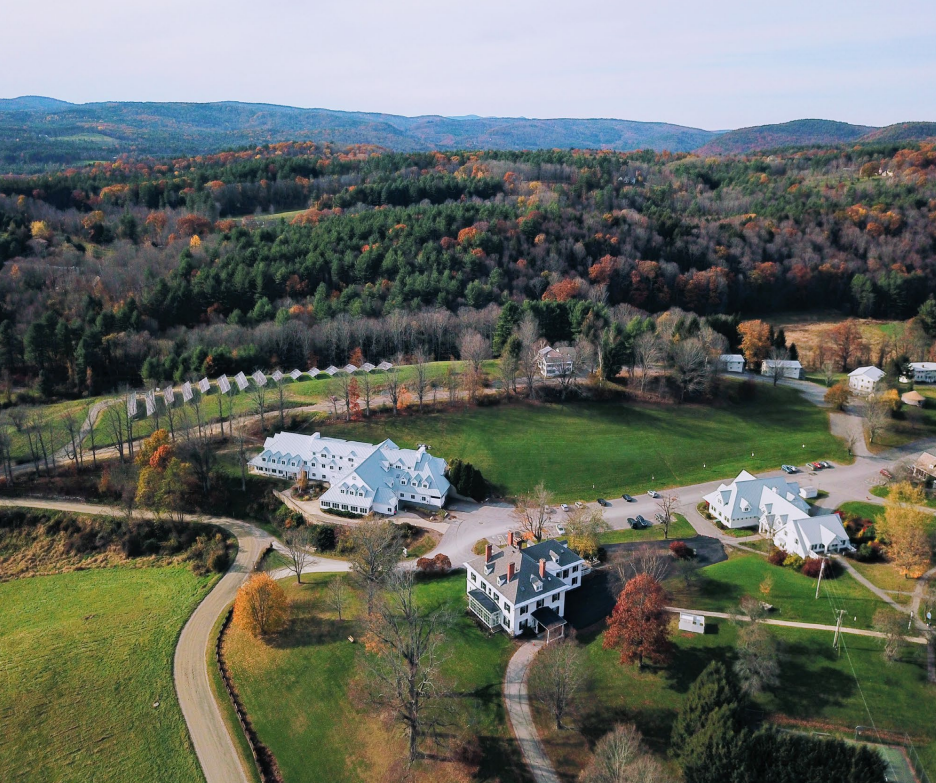Do you support refugees and newcomers with affordable housing services? This blog post is for you! Switchboard has partnered with Refugee Housing Solutions to share training and promising practices related to housing solutions for newcomers. Today, we’re spotlighting the innovative housing work of World Learning Inc., a global nonprofit and accredited academic institution with a campus in rural southern Vermont that transformed college dorms into temporary housing solutions.
Transforming a Campus into Newcomer Housing
The Brattleboro community, where World Learning is headquartered, was one of the first rural American communities to welcome Afghans. World Learning provided short-term housing to 107 Afghans beginning in January 2022 and is preparing to welcome 70 more this fall.
The infrastructure of World Learning’s 200-acre campus, particularly residence halls, was quickly adapted to house newcomers last summer. Afghan families were, of course, different from a traditional student population, particularly because more than a third were children. In addition to modifying dorm rooms and residence halls to suit families with children, World Learning opened a welcome center and provided access to a dining hall, classrooms, the library, a computer lab, prayer rooms, and athletic facilities.
World Learning has 111 individual dormitory rooms in seven residence halls, with 242 beds at maximum capacity. By March, they housed 92 Afghans on campus, living and learning at the campus headquarters. It is optimal for World Learning to try to give families the opportunity to decide for themselves how they’ll occupy and live comfortably in a grouping of rooms that traditionally are separated into individual rooms for one or two students. Each residence hall also has communal and kitchen spaces, which World Leaning was happy to renovate to accommodate newcomer families. World Learning also provided access to larger kitchens on campus, including one in their welcome center.
Adults staying on campus are enrolled in World Learning’s New Vermonter Education Program (NVEP) for English Language Learning and Cultural Orientation. Most Afghan families stayed between two and three months before transitioning to more permanent housing, and the adults continued to attend the NVEP classes after moving off-campus. Other employment training and case management also continue beyond campus stays.

The Importance of Partnerships
In this innovative initiative to house Afghans, World Learning partnered with the Vermont State Housing Authority (VSHA) to optimize Emergency Rental Assistance (ERA) use. When ERA funds—which were established through the U.S. Congressional Consolidated Appropriations Act of 2021—get to Vermont, they become the Vermont Emergency Rental Assistance Program (VERAP). In 2021, Vermont government officials agreed refugees and Afghan newcomers were eligible for VERAP in these categories:
- Able to demonstrate the risk of experiencing homelessness or housing instability
- Household income is at or below 80% of the area’s median income
After exploring Treasury Department guidance, Vermont determined that VERAP could be distributed 1) in large tranches and 2) directly to World Learning rather than to individual clients in smaller sums. World Learning’s engagement with the Vermont State Housing Authority started one year ago. The partnership developed from a shared concern for Afghan newcomers with the Ethiopian Community Development Council (ECDC), which looked to provide housing as a core resettlement service alongside others like access to health care and education. ECDC’s staff were instrumental in connecting VSHA and World Learning to consider what might be possible in collaboration. World Learning knew one of their key offerings in the resettlement puzzle for southern Vermont was the campus infrastructure.
World Learning is fortunate that VSHA has innovative, solution-oriented thinkers to guide their overall approach to short-term housing. While World Learning is the representative of the physical space hosting newcomers and was certainly a key support in VSHA’s advocacy, VSHA has been the driver of advocacy related to housing the new arrivals and use of VERAP.
Enrolling all adult newcomers as students in World Learning’s New Vermonter Education Program was part of another key innovation. By incorporating housing into the education program, the newcomers’ participant room fee was covered by VERAP. The participant fee acknowledges the education program and, as such, exempts World Learning from the landlord-tenant statute without which the campus would likely not be available for this use.
“I believe short-term housing like what we are providing on our campus [can and] should be more regularly utilized for refugee resettlement, particularly as more rural communities seek to welcome refugees. I think we are seeing through our partnership with VSHA the need for a rethinking on how we use and adapt existing spaces to respond to the next wave of housing nationally and how, through this, we encourage greater social cohesion in communities across the country.”
—Joel Colony, World Learning’s Vice President, External Engagement and Advocacy
The Ethiopian Community Development Council (ECDC), a national resettlement agency, is also an essential partner. ECDC provides office space for case management and legal support staff, though much of their work is done on campus. For example, ECDC staff work on campus at the welcome center and start with a tour of the facilities, including the dining hall, classrooms, and accommodations. ECDC staff also enroll clients in VERAP when they arrive on campus. And, after on-campus stays, VERAP can follow clients to their next destination in more permanent housing.
Additional funding partners for this innovative solution to providing housing and services for newcomers include foundations like Putnam, KeyBank, and Starbucks, and other organizations such as Welcome.US.
Interested in Launching a Similar Partnership?
World Learning encourages nonprofits, the private sector, and higher education institutions across the U.S. to consider what they could bring to refugee and other newcomer resettlement in their communities. This work takes a village! It’s important that communities begin by considering what resources they have to share and then what they need to acquire, recruit, or build.
World Learning benefited from a passionate and supportive local community, strong local partnerships, and state government leaders who supported resettlement. They had the good fortune to recruit a refugee resettlement agency and had resources to help establish its office. For housing, they also had a willing state housing authority with which to start a conversation to see what could be possible.
Organizations seeking similar partnership should first engage with their State Refugee Coordinators and the state and local housing authorities. Emergency Rental Assistance was and remains essential to newcomer housing efforts in Southern Vermont, and it may be the right fit for similar efforts in other states. Memoranda of Understanding or other formal agreements can help guide the collaboration and ensure clear division of labor and accountability.
Finally, resettlement is challenging work. Due to the urgency of the efforts and the limited resources, there can be a tendency to attempt a “cookie cutter” approach, which is rarely effective. Creative short-term housing like what World Learning has provided in Vermont will become increasingly necessary as more newcomers arrive in both urban and rural communities.
Recommended Resources
- To learn more about the work World Learning has done and continues to do, visit their website.
- Connect with Refugee Housing Solutions (RHS) to learn about how our subject matter experts can provide assistance to house refugees in your community. Click here to schedule a 1:1 technical assistance session.










